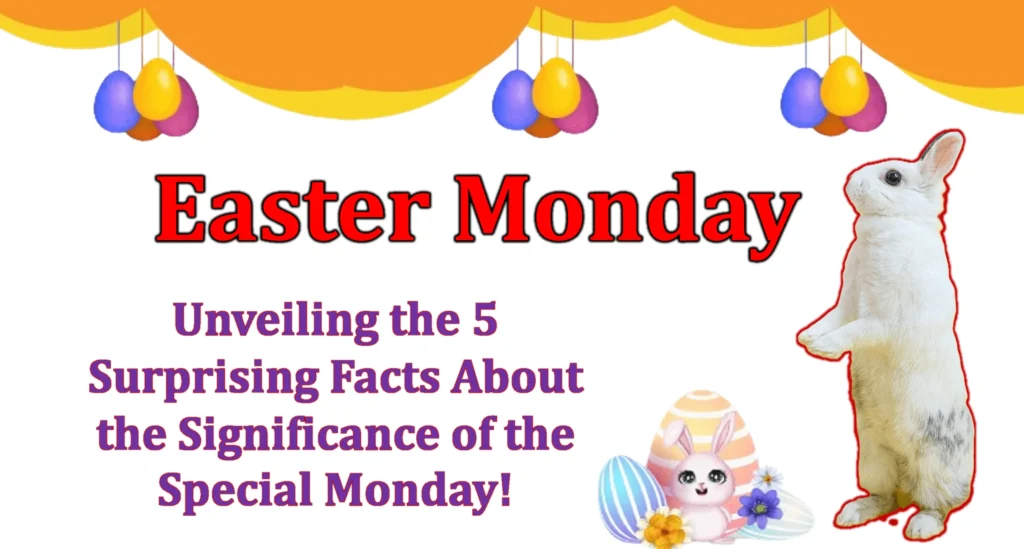
Easter Monday stands as an integral part of the Easter celebration, extending the jubilant atmosphere of Easter Sunday into the beginning of the week. While Easter Sunday typically steals the spotlight with its commemorations of the resurrection of Jesus Christ, it holds its own significance across various cultures and traditions worldwide.
In this blog post, we’ll delve into the lesser-known aspects of it, uncovering surprising facts that shed light on the richness of this post-Easter holiday. From its historical roots to its modern-day observances, we’ll explore the multifaceted significance of it that often goes overlooked.
Fact 1: History and Origins of Easter Monday
The tradition of Easter Monday in Christianity
It holds a special place in the Christian calendar, following the solemn observance of Easter Sunday. In Christianity, Easter Sunday commemorates the resurrection of Jesus Christ, a pivotal event that marks the triumph of life over death and the fulfillment of divine promises. Easter Monday, as an extension of this celebration, serves as a day of reflection, rejoicing, and continued worship. It allows believers to carry forward the joyous spirit of Easter Sunday into the new week, deepening their appreciation of the significance of Christ’s resurrection.
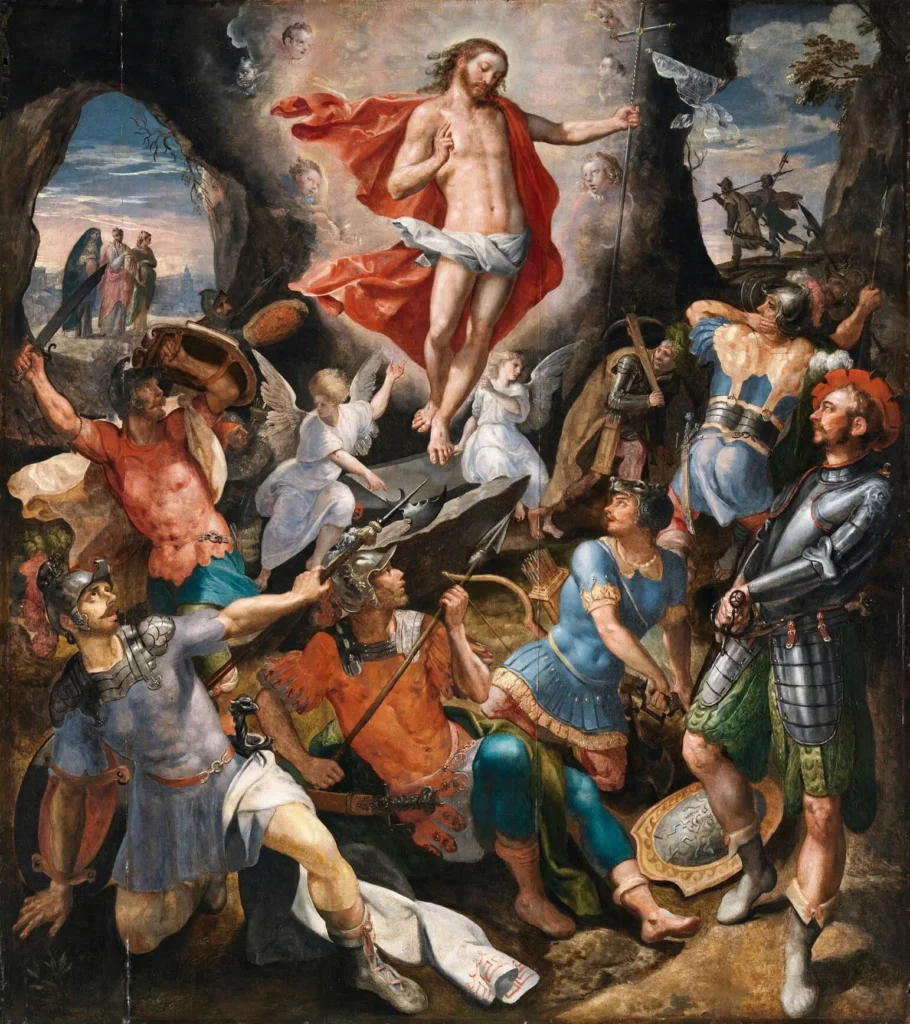
Historical significance of Easter Monday around the world
Beyond its roots in Christianity, it holds historical significance in cultures around the globe. In many European countries, it has long been observed as a public holiday, marked by various customs and traditions. For example, in parts of Europe, it is associated with the ancient practice of “washing” or “dousing” with water, symbolizing purification and renewal. In other regions, such as Poland and Hungary, it is celebrated with colorful processions, folk music, and traditional dances, reflecting centuries-old customs passed down through generations.
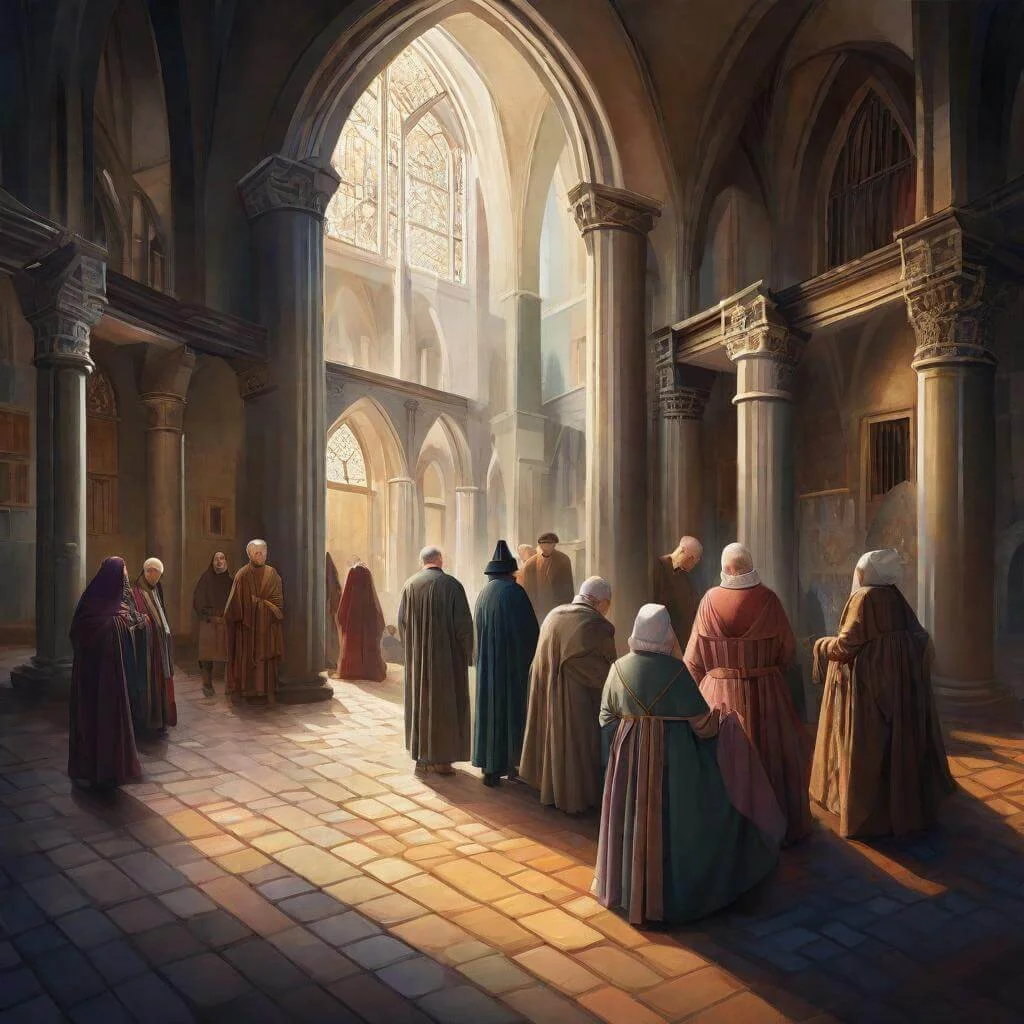
Similarly, in African and Caribbean countries, it is often celebrated with vibrant festivities that blend Christian traditions with indigenous customs. These celebrations may include feasting, drumming, dancing, and storytelling, creating a tapestry of cultural expressions that honor both religious beliefs and ancestral heritage.
Evolution of Easter Monday customs and celebrations
Over the centuries, the customs and celebrations associated with Easter Monday have evolved in response to changing social, cultural, and religious dynamics. In medieval Europe, for example, it was marked by elaborate processions, theatrical performances, and community feasts, all aimed at reaffirming faith and fostering communal solidarity. As societies modernized and urbanized, these traditional practices gradually gave way to new forms of celebration, such as Easter egg hunts, picnics, and family gatherings.
Today, it continues to evolve, with communities around the world adapting its observance to suit contemporary tastes and lifestyles. While some may choose to attend religious services or participate in time-honored rituals, others may opt for more secular activities, such as outdoor recreation or charitable work. Despite these changes, the underlying themes of renewal, hope, and spiritual rebirth remain central to the enduring significance of it in both Christian and secular contexts.
Fact 2: Cultural and Religious Significance
Spiritual and Renewal Aspects of Easter Monday
Religious observations and services on Easter Monday
It holds spiritual significance for Christians worldwide, marked by special church services and religious observances. These services often emphasize themes of renewal, hope, and gratitude in light of Christ’s resurrection. Attendees may participate in prayers, hymns, and readings that reflect on the meaning of Easter and its implications for their faith journey.
Symbolism of rebirth and new beginnings
It symbolizes the dawn of a new era, both spiritually and symbolically. The resurrection of Jesus Christ signifies the triumph of life over death and offers believers the promise of redemption and eternal life. As such, Easter Monday is often viewed as a time for personal renewal and spiritual awakening, encouraging individuals to reflect on their lives and embrace new beginnings.
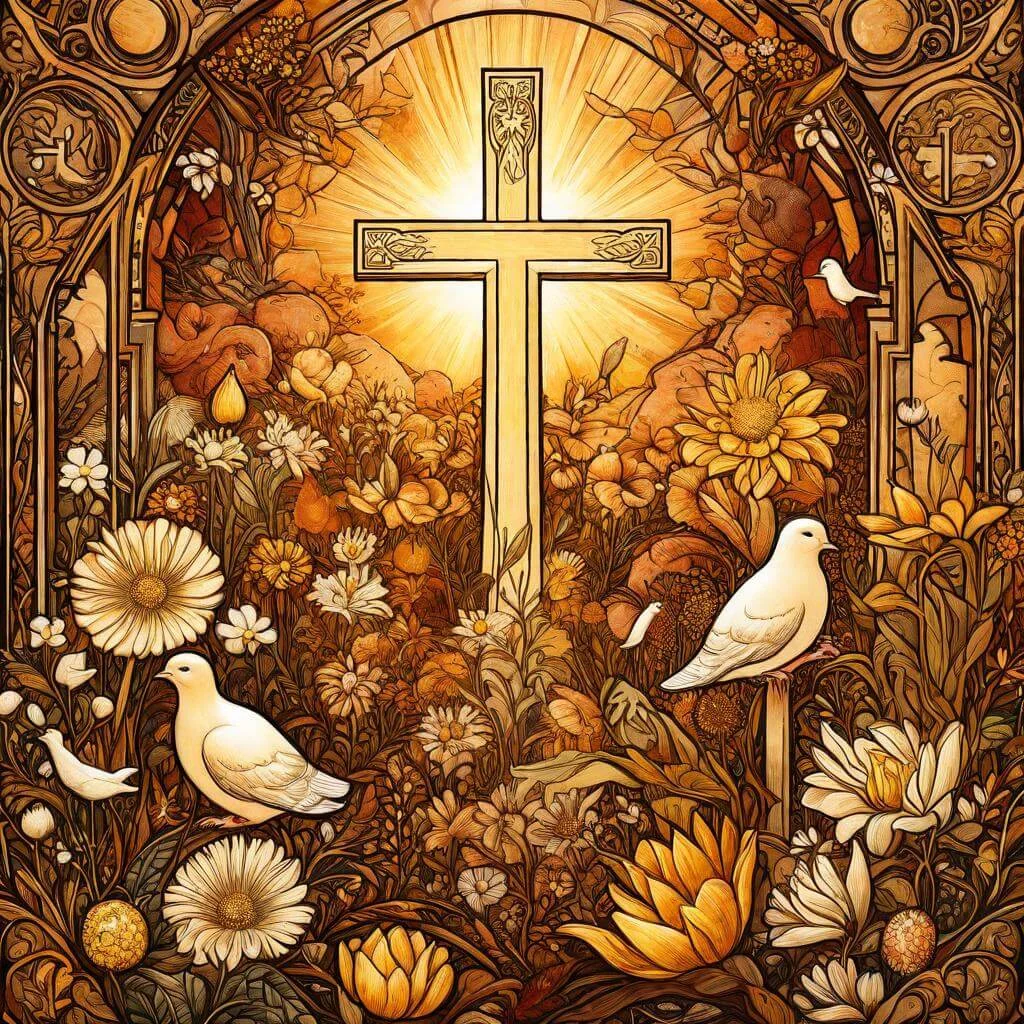
Personal reflections and resolutions
Many people use Easter Monday as an opportunity for introspection and self-examination. It is a time to reflect on the past year, assess personal growth, and set intentions for the future. Whether through prayer, meditation, or quiet contemplation, individuals may seek guidance and inspiration to embark on a journey of self-improvement and spiritual fulfillment.
The significance of the Easter bunny and Easter eggs
The Easter bunny and Easter eggs are iconic symbols associated with it, representing fertility, abundance, and the arrival of spring. The tradition of the Easter bunny delivering eggs dates back to ancient pagan rituals celebrating the vernal equinox and the renewal of life. Over time, these symbols became intertwined with Christian Easter celebrations, serving as playful reminders of the joy and abundance associated with Christ’s resurrection.

Connection between Easter Monday and springtime rituals
Its placement in early spring aligns it with various seasonal rituals and traditions that celebrate the awakening of nature and the arrival of warmer weather. In many cultures, it is marked by outdoor activities, such as egg rolling, picnics, and nature walks, that symbolize the rejuvenation of the earth and the promise of new life.
Importance of feasting and family gatherings on Easter Monday
Feasting and family gatherings are central to its celebrations, providing an opportunity for loved ones to come together in fellowship and celebration. Whether sharing a traditional Easter meal or enjoying festive treats, these gatherings foster a sense of community and unity, reinforcing bonds of kinship and friendship. Moreover, they serve as occasions for gratitude and joy, as families reflect on the blessings of the past year and look forward to the opportunities that lie ahead.
Fact 3: Economic Impact of Easter Monday Celebrations
Retail and shopping trends on Easter Monday
It is often associated with increased retail activity, as consumers take advantage of post-holiday sales and promotions. Retailers may offer discounts on Easter-related merchandise, such as decorations, chocolates, and gifts, to attract shoppers looking for bargains. Additionally, many people use it as an opportunity to purchase spring-themed items, clothing, and home goods, contributing to a boost in sales for various retail sectors.

Tourism and travel industry statistics on Easter Monday
It also has significant implications for the tourism and travel industry, with many individuals taking advantage of the long weekend to embark on vacations or short getaways. Popular destinations may experience an influx of visitors seeking to escape the routine of daily life and explore new destinations. Hotels, resorts, and other hospitality businesses may see an uptick in bookings, while attractions and tourist sites may experience increased foot traffic and visitor spending.
Influence of Easter Monday on the global economy and businesses
The economic impact of it extends beyond retail and tourism sectors, influencing various aspects of the global economy. Businesses across industries may adjust their operations to accommodate the holiday, such as offering special promotions, adjusting staffing levels, or modifying production schedules. Additionally, it may serve as a barometer for consumer confidence and spending patterns, providing insights into broader economic trends and indicators.
Fact 4: Folklore and Traditions Surrounding Easter Monday
Superstitions and beliefs related to Easter Monday
It is steeped in folklore and superstitions, with various beliefs and customs associated with the day. In some cultures, it is believed that water collected on Easter Monday possesses special properties and can bring blessings, healing, or protection from harm. This belief has led to the practice of “dousing” or sprinkling water on friends and family as a symbol of good fortune and purification. Other superstitions may revolve around predicting the weather, foretelling future events, or warding off evil spirits through rituals and charms.
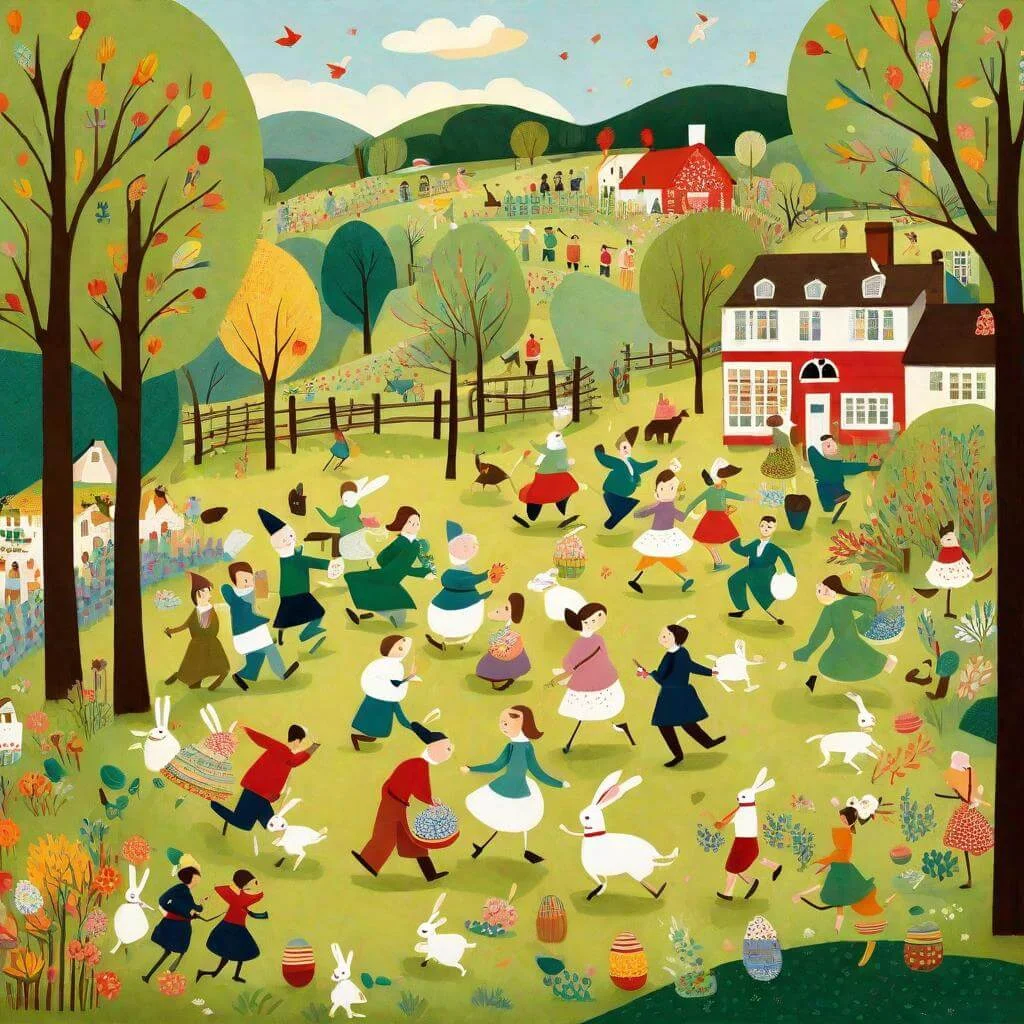
Folk tales and myths about the origins of Easter Monday
Throughout history, numerous folk tales and myths have emerged to explain the origins of it and its significance. These stories often blend elements of Christian symbolism with pre-existing folklore and cultural traditions. One popular myth suggests that it was the day when Jesus appeared to his disciples after his resurrection, imparting his blessings and teachings before ascending to heaven. Another tale recounts the exploits of legendary figures or mythical creatures associated with it, such as the Easter hare or the Easter fox, who are said to bring gifts or play pranks on unsuspecting individuals.
Traditional games and activities played on Easter Monday
It is celebrated with a variety of traditional games and activities that bring communities together in light-hearted fun and amusement. One common activity is egg rolling, where participants race to roll decorated eggs down a hill or slope, with the winner being the one whose egg travels the farthest without breaking. Egg tapping, egg tossing, and egg hunts are also popular pastimes, challenging participants to test their skills and luck in pursuit of Easter-themed prizes.
Additionally, Easter Monday may feature other games and festivities, such as sack races, bonnet parades, and maypole dancing, which add to the festive atmosphere and showcase the creativity and ingenuity of participants. These traditions not only provide entertainment and enjoyment but also serve as reminders of the rich cultural heritage and collective spirit that characterize Easter Monday celebrations around the world.
Fact 5: Contemporary Observance of Easter Monday
Modern Interpretations and Adaptations
In contemporary times, Easter Monday continues to be celebrated with a blend of traditional customs and modern interpretations. While the religious significance of the day remains paramount for many, others may approach Easter Monday as a time for relaxation, recreation, and spending quality time with loved ones. In some communities, the emphasis has shifted towards secular activities, such as Easter egg hunts, picnics, and outdoor adventures, which cater to individuals of all ages and backgrounds.
Commercialization and Festivities
Like many holidays, Easter Monday has become commercialized in some parts of the world, with businesses capitalizing on the festive atmosphere to promote sales and events. Retailers may offer special discounts on Easter-themed merchandise, while restaurants and cafes may feature seasonal menus and promotions. Additionally, Easter Monday may coincide with other cultural events or festivals, further adding to the excitement and vibrancy of the day.
Challenges and Controversies Surrounding the Holiday
Despite its widespread observance, Easter Monday is not without its challenges and controversies. In some regions, concerns have been raised about the environmental impact of Easter-related activities, such as excessive consumption and waste generation. Additionally, debates may arise regarding the secularization of Easter Monday and its perceived dilution of religious significance. Furthermore, disparities in access to resources and opportunities may highlight underlying social and economic inequalities, prompting calls for greater inclusivity and equity in holiday celebrations.
Conclusion & FAQs
Throughout this blog post, we’ve delved into the multifaceted significance of Easter Monday, uncovering surprising facts about its history, cultural significance, economic impact, folklore, and contemporary observance. From its origins in Christian tradition to its evolution into a global holiday celebrated in diverse ways, Easter Monday serves as a reminder of the rich tapestry of human culture and the enduring power of shared rituals and traditions.
As we conclude our exploration of Easter Monday, I encourage readers to take a moment to reflect on the meaning of this special day and consider how they might incorporate its themes of renewal, community, and celebration into their own lives. Whether through religious observances, cultural traditions, or acts of kindness and generosity, Easter Monday offers us an opportunity to connect with others and embrace the spirit of hope and joy that defines this cherished holiday.
Frequently Asked Questions (FAQs)
What is Easter Monday, and why is it celebrated?
Easter Monday is the day after Easter Sunday, marking the second day of the Easter celebrations. It is celebrated in remembrance of the resurrection of Jesus Christ, which is believed to have occurred on Easter Sunday. Easter Monday extends the joyous atmosphere of Easter Sunday and is often observed with various cultural and religious traditions.
How does Easter Monday differ from Easter Sunday?
Easter Sunday commemorates the resurrection of Jesus Christ, while Easter Monday continues the celebration by reflecting on the implications of Christ’s resurrection. While Easter Sunday is typically marked by religious services and family gatherings, Easter Monday may involve additional activities such as picnics, egg hunts, and community events.
What are some common traditions and customs associated with Easter Monday?
Common traditions include egg rolling, egg hunts, picnics, and family gatherings. In some cultures, there are also religious processions, special church services, and symbolic rituals such as water dousing or sprinkling.
Is Easter Monday a public holiday worldwide?
Easter Monday is a public holiday in many countries with Christian traditions, though the extent of its observance and the associated customs may vary from region to region.
What is the significance of Easter Monday in Christianity?
Easter Monday holds religious significance as it marks the continuation of the Easter celebration and serves as a time for reflection, renewal, and rejoicing in the resurrection of Jesus Christ.
How do different cultures and countries celebrate Easter Monday?
Different cultures and countries celebrate Easter Monday with a variety of customs and traditions. These may include religious services, festive meals, outdoor activities, and community events tailored to local customs and beliefs.
Are there any specific foods or dishes associated with Easter Monday?
Traditional foods vary by region but may include dishes such as lamb, ham, hot cross buns, and Easter-themed desserts like Easter eggs and simnel cake.
How does Easter Monday impact businesses and the economy?
Easter Monday can have economic implications, particularly in retail and tourism sectors. Businesses may experience increased sales due to holiday-related spending, and tourism destinations may see a surge in visitors seeking leisure activities or short getaways.
Are there any superstitions or beliefs associated with Easter Monday?
Some cultures have superstitions related to Easter Monday, such as beliefs about water collected on this day having special properties or predictions about the weather for the upcoming season.
How can individuals make the most of Easter Monday to reflect on personal renewal and spiritual growth?
Individuals can use Easter Monday as a time for quiet reflection, prayer, and contemplation on the themes of renewal, hope, and faith. It’s an opportunity to reaffirm personal beliefs and set intentions for spiritual growth in the coming year.
